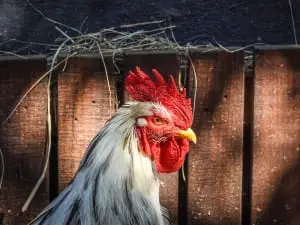
Chickens are known to be very active and energetic animals, these birds will be up before you and will spend the day running around taking dust baths and interacting with each other.
If one, or some, of your birds are not moving, but are still breathing you’d be right to be worried. This article looks into it.
Table of Contents
Chicken not moving but breathing:
Chickens can easily fall ill to a variety of illnesses and these illnesses can cause the bird to develop some strange symptoms, here are reasons why your bird may not be moving but is still breathing:
Mareks disease:
This is one of the most common chicken diseases and it can be very harmful to your flock. This disease is a type of herpes viral disease that will stay with the bird for life even if the bird stops showing signs of having this disease.
One of the most common signs of a bird suffering from mareks is paralysis. Paralysis may be why your bird is not moving but is still breathing. Mareks will cause the bird to lose motion in its legs, wings, and neck.
Other signs to look for when trying to figure out if the bird has mareks include a change in the bird’s eyes, (either grey irises or irregular-looking pupils), depression, a loss of appetite, a loss of weight, dehydration, and eventually paralysis.
The feather follicles of an infected bird may also start to develop tumors.
Unfortunately, because some birds will not show signs of having this disease, they can infect other birds without you knowing.
What to do:
Unfortunately, once a bird develops Mareks the bird cannot be cured of it, this virus stays with the bird for life.
Once tumors develop in the bird, and paralysis sets in, the bird’s quality of life will greatly start to decline.
The best way to combat this disease is to keep it from becoming an issue in the first place, Vaccinating your baby birds when they are one day old, before they even make it onto your property, is recommended.
Newcastle disease:
Another disease that can cause your bird to not move, but keep breathing is Newcastle disease. This is a viral disease that can be deadly.
One of the symptoms of this disease, which shows up when the disease has progressed quite far, is paralysis. This may be what you’re seeing in the bird.
The disease strain that will cause paralysis is the strain that affects the bird’s nervous system.
Other symptoms of this disease in birds include nasal discharge, green/watery diarrhea, coughing, sneezing, depression, abnormal egg shape or color, droopy wings, twisted head, swelling of the eyes and neck, and in some cases, sudden death with no prior symptoms.
What to do:
Taking the bird to the vet is recommended. There are a variety of illnesses that share these same symptoms so getting a diagnosis from a professional is recommended.
There is no treatment for this disease but if the bird develops a secondary bacterial infection then this can be controlled.
Botulism:
If your bird doesn’t have the first two diseases then the bird may have botulism. This disease develops in chickens who eat or drink foods or drinks that contain the neurotoxin produced by the bacteria Clostridium botulinum.
This toxin affects the bird’s nervous system causing the bird to go weak and then develop paralysis in its body.
If your birds have recently been pecking at a dead flock mate, eating rotten food scraps, or drinking from stagnant water then your bird may have become infected.
The main symptom that indicates that the bird has this illness is paralysis, the bird can usually be found sitting on the ground unable to stand.
The muscles that are needed for breathing will become paralyzed just as the rest of the bird’s muscles will be.
Other symptoms like nasal discharge or diarrhea aren’t a symptom of this illness.
What to do:
Figuring out if your bird has this disease, even with lab testing at the vet, can be difficult.
In addition, there is no specific treatment for this disease in your bird. If the bird hasn’t ingested enough toxins to kill it then you can help the bird recover and allow the toxin to wear off through nursing
If you enjoyed this article then you may also be interested in other chicken related articles. Here are some articles that you may be interested in: Hard Lump In Chickens Throat, Chicken Cremation, Wobbly Chicken, Chicken Having A Seizure, Sling For A Chicken With A Broken Leg

